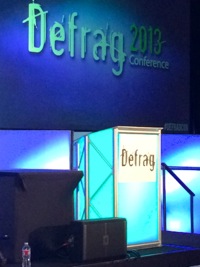 Greetings from the 7th annual Defrag Conference in Denver. Yes, this is my personal seventh, too — I wouldn't miss this event! I've reported on every single one (which actually shows in my category cloud at the right). The first day of the 2013 version of Defrag is history now, and you can read lots about it at my Twitter stream here: @GraemeThickins. If you want the full firehose, the very busy hashtag is #defragcon. If you're into visuals, hit my Flickr set (you can view the visuals shown in this post in full size there). UPDATE: I also posted a few video interviews on my YouTube channel. (Please subscribe to it. If I reach 100 subscribers, YouTube will let me live stream — woo-hoo!)
Greetings from the 7th annual Defrag Conference in Denver. Yes, this is my personal seventh, too — I wouldn't miss this event! I've reported on every single one (which actually shows in my category cloud at the right). The first day of the 2013 version of Defrag is history now, and you can read lots about it at my Twitter stream here: @GraemeThickins. If you want the full firehose, the very busy hashtag is #defragcon. If you're into visuals, hit my Flickr set (you can view the visuals shown in this post in full size there). UPDATE: I also posted a few video interviews on my YouTube channel. (Please subscribe to it. If I reach 100 subscribers, YouTube will let me live stream — woo-hoo!)
So, how would I summarize Day One? Well, you really had to be there, but here's a shot at the high points for me (in order of appearance):
• Ray Wang of Constellation Research kicked it off with "The Identity Manifesto: Seven Points on the Future of Identity"… the money slide shown herein.
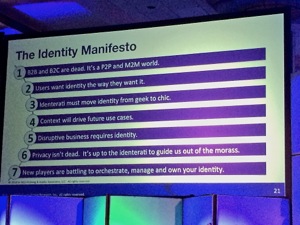
• PaulKedrosky,KauffmanFellow, VC, frequent CNBC commentator, and perennial
speaker at Defrag, did another fascinating talk, this one called "Good
Question"…interspersed with his unique and crazy data/research insights. We got a whole run-down on the history of the "knee slide" in soccer, for example… 🙂 The net-net of his talk: "What makes good questions? Those that create an information gap."
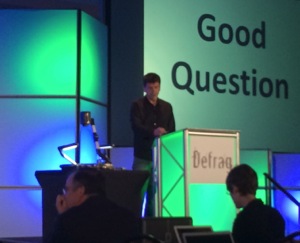
• Anjan Srinivas of Nutanix gave a really great talk on "SoftwareisEatingtheData Center"…in which he cited such trends as hypervisors being the new commodity, the rise of server-side flash, and the convergence of compute and storage.
• StephenMesser ofCollective[i] delivered an absolutely fascinating Big Data talk on "UnpackingData’sBaggage:LessonsFromAirportSecurity" — a stark contrast between our TSA, which costs $43B and screens everybody vs. the approach of El Al Airlines, which has had zero incidents 1969-present, by focusing on anomolies and asking the right questions.
• Jerry Colonna, former VC colleague of Fred Wilson's (now life coach) and Brad Feld, Foundry Group partner, bared it all on stage on "The Emotional Challenges of Enrepreneurship" — which really could have been titled "…the Challenges of Being a VC." Especially a unique one like Brad. Hey, do you think it's freakin' easy being Brad??
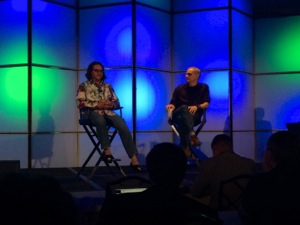 One of Brad's best lines during the talk:" "The machines are all laughing at us on some level." (Thanks to Robbie Jack for reminding me about that one.)
One of Brad's best lines during the talk:" "The machines are all laughing at us on some level." (Thanks to Robbie Jack for reminding me about that one.)
• Klint Finley (@kintron), a writer for Wired and TechCrunch, did a talk on "Quantified Work: Tracking Efficiency Without Crushing Souls"… in which he asked, "What if you had an 'employabilty' score like a credit score?" We sure aren't there yet, as influence rankings are made for marketers, not employers, he said. He has some good links on this topic here.
• Tim Falls, Director-Developer Relations, SendGrid, gave a talk about how developer marketing is best done by building relationships. He paid tribute to John Sheehan and Twilio, whom he said "were huge in helping his company us build our developer community."
• Oren Teich, COO, Heroku/Salesforce, gave perhaps my favorite talk of the day. He called it "Great, Software Ate My World. Now what?" — but it was really about design, and its growing importance in our
 hugely techy world. Interestingly, I had earlier tweeted a photo of Heroku's booth, saying it was the best looking one here because of what? .. design, of course. His money quote: "Design creates delight… it's the thought that goes into the deep experience." Yes indeed, that's what matters today! Oren admitted he wasn't a designer himself, but that he had a really good one at Heroku. Yep!
hugely techy world. Interestingly, I had earlier tweeted a photo of Heroku's booth, saying it was the best looking one here because of what? .. design, of course. His money quote: "Design creates delight… it's the thought that goes into the deep experience." Yes indeed, that's what matters today! Oren admitted he wasn't a designer himself, but that he had a really good one at Heroku. Yep!
• Chris DeVore of Founders Co-Op gave a fascinating talk called "Industrial Entropy and the Future of Work" and asked, "what happens when work is decoupled from the enterprise?" I swear I heard him say that productivity advances are already no longer driven by enterprises. There's that theme of the free agent economy coming on strong again.
• Ian Glazer of Gartner gave an amazing overview of the state of privacy, "Big P Privacy in the Era of Smaller Things." He said that for "liitle p" privacy play nice with "big P" privacy, preferences must travel with the data — a concept he calls "relationship context metadata." It's a really big deal, and Ian is the guy to follow if you want to stay on top of it.
• FInally, I call out Lorinda Brandon of Mashery for a very passionate talk on "The Geek Girl Imperative." She asked "why are we separating women out to learn about technology when we don't in other disciplines?"
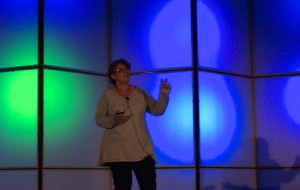 Young girls should not be segregated like they can't handle tech unless they're coddled and shielded, like tech is some exclusively boys world. She also panned women-only adult networking as being not helpful, noting she's always avoided such things — and "I've had a pretty amazing career." Hats off to @lindybrandon for standing up and shouting, "Why aren't there more girls here?!?"
Young girls should not be segregated like they can't handle tech unless they're coddled and shielded, like tech is some exclusively boys world. She also panned women-only adult networking as being not helpful, noting she's always avoided such things — and "I've had a pretty amazing career." Hats off to @lindybrandon for standing up and shouting, "Why aren't there more girls here?!?"
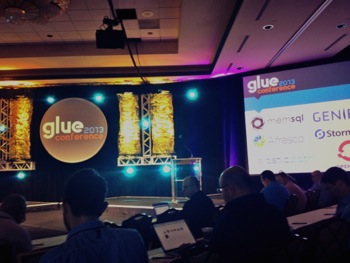


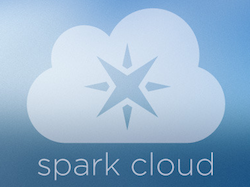
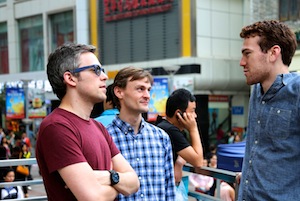
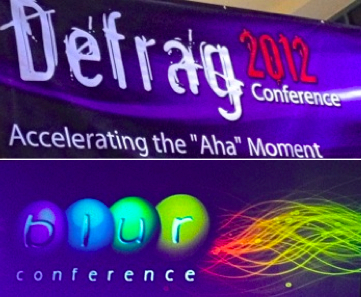
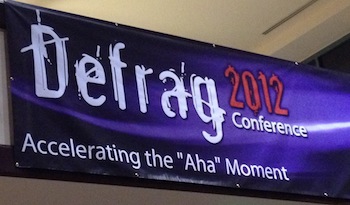

Recent Comments